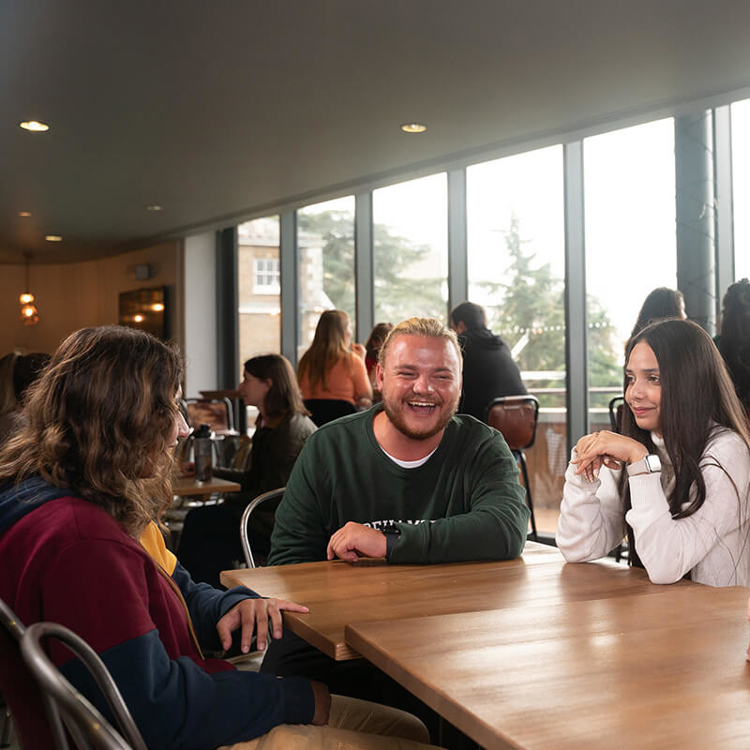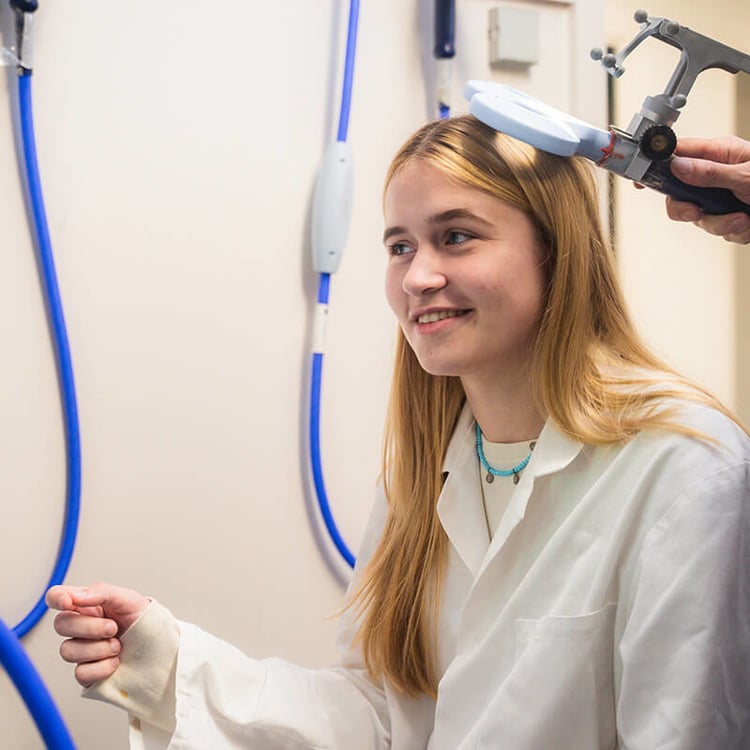Duration:
1 year (full-time) - Available for September and January
2 years (part-time) - Available for September
Number of credits:
180
Start date(s):
September 2025
January 2026
September 2026
Convert your existing bachelor's degree into a Masters in Psychology and take your first step towards a career as a psychologist at a leading London university.
Did you know?
You can apply to this course with a bachelor’s degree in any subject, giving you a unique pathway to becoming a psychologist — even if your background isn’t in psychology.
Modules
Module details: This module helps you develop and execute an independent research project or industry-focused study, culminating in a dissertation. Over two terms, you will gain expertise in research design, ethics, qualitative and quantitative methods, and data analysis, concluding with writing up your research report. The structured teaching ensures mastery of research methods, critical data analysis, ethical adherence, and effective communication of research plans and findings. By the end, you will demonstrate competence in conducting rigorous, ethical, and impactful psychological research using primary data.
How you will learn: Lectures introduce key research concepts, philosophies and methods, while seminars offer experiential learning through practical tasks, supported by asynchronous digital content and dedicated supervision throughout both terms.
Assessment: The assessment includes an Ethics Task outlining the research plan and ethical considerations, and a research dissertation demonstrating research design, execution, and evaluation. Formative assessments involve peer feedback on an anonymised Ethics Task draft and group-level staff feedback, helping students refine their approach. Additionally, each student receives supervisor feedback on a dissertation draft to assess progress, identify areas for refinement, and guide further development.
Module details: This module introduces key historical and conceptual issues in psychology, from its scientific beginnings to modern applied topics, integrating foundational knowledge with personal and professional development. You will critically examine psychology’s evolution, assessing its impact on contemporary research and methodologies. Through case studies in individual differences, social, and health psychology, you will explore theoretical, methodological, and ethical dimensions. Emphasising evidence-based practice, the module fosters critical evaluation, ethical conduct, and professional identity, equipping you with essential skills for diverse psychology careers.
How you will learn: Lectures cover historical paradigms, ethics, practice, and individual differences, while seminars focus on applying theories through experiential learning, supported by asynchronous digital content.
Assessment: Assessment includes an audio presentation on either power and obedience in psychological paradigms or the ethical implications of psychometric testing, and a critical review with a reflective conclusion. Formative assessment involves seminar discussions with peer and tutor feedback.
Module details: This module explores the biological and cognitive processes underlying perception, cognition, and behaviour. It examines how the brain, nervous system, and physiological systems influence mental functioning and experience. Cognitive topics include perception, attention, memory, and language. By integrating these areas, the module provides a systematic understanding of how diverse populations interpret the world. You will develop critical skills to engage with research findings and theoretical perspectives in biological and cognitive psychology, enhancing your analytical and evaluative abilities.
How you will learn: Lectures cover key theories and research on perception, attention, emotion, motor functions and memory, while seminars provide experiential learning through discussions, debates, and practical applications, supported by digital learning materials.
Assessment: Assessment includes a recorded group presentation on cognitive processes, and a blog post on perception and cognition in neurodiverse populations, following ethical AI guidelines.
Module details: This module explores key psychological subfields in relationships and identities, focusing on how individuals interact with the social world. It examines their development, research, practical implications, and potential interventions. Identity and social development are central to psychology, offering students essential theoretical and research-based knowledge. By critically evaluating research and applying insights to practice, students develop transferable skills for further study or professional settings. The module fosters analytical thinking and practical understanding of identity and social relationships in psychology.
How you will learn: Lectures will cover key theories, research, and recent studies on identity, relationships and the social world, development of the self and identity, attitudes and social cognition, while seminars offer experiential learning through discussions, debates, and practical applications, supported by asynchronous digital resources, including pre-recorded videos, linked materials, or exercises.
Assessment: This module is assessed through an infographic summarising theory and research on a social development topic and a qualitative lab report focused on self and identity.
Module details: This module provides essential skills in scientific research, including research design, data collection, analysis, and synthesis, preparing you for your research project and future careers. You will gain expertise in data analysis and relevant technologies, enhancing employability across various fields. The module integrates quantitative and qualitative research methods with a focus on methodological rigour and reproducibility. You will conduct literature reviews, identify research gaps, and apply psychological research to real-world issues, culminating in a research report and proposal to develop persuasive, evidence-based arguments.
How you will learn: Lectures will cover key research methods focusing on quantitative approaches, while seminars provide experiential learning through practical applications like data collection and analysis. Additionally, there will be asynchronous digital support, including recorded materials and online forums.
Assessment: Assessment includes a quantitative lab report on data collection and analysis, and a group poster presenting a qualitative research proposal, covering research paradigms and methods. Formative assessment involves class discussions on research paradigms with peer and tutor feedback linked to the summative assessments.
Module details: This module focuses on mental health, encouraging critical thinking about current conceptualisations of mental health and ill-health, as well as issues related to diagnosis and treatment. You will explore factors affecting individual and societal experiences of mental ill-health, covering biopsychosocial perspectives on the causes and maintenance of common disorders. The module aims to develop mental health literacy through the critical evaluation of various perspectives while enhancing practical research skills, including assessing the effectiveness of different treatments.
How you will learn: Lectures will cover models, theories, and frameworks in mental health through research-informed learning including the history of mental illness and its treatment, classifying psychiatric disorders, disordered eating and substance abuse while seminars offer experiential activities such as practical skills, debates, and applied cases, with asynchronous digital support, including online testing, learning journals, reflection, and short talks.
Assessment: This module is assessed through a Digital Information Pack on a psychopathological condition, aimed at service users or carers, and a Case Study essay analysing a real-life case, focusing on diagnosis, treatment, and prognosis. Formative assessment involves group work critiquing clinical trial designs, with peer and tutor feedback aligned to the summative assessments.
These are the current planned modules on this course and may be subject to change.
Join an accredited course
Our course is proudly accredited by the British Psychological Society (BPS).
This accreditation is essential for those who wish to become Chartered Psychologists and guarantees that the course meets the highest standards of psychological education.
Graduates who successfully complete the course are eligible for Graduate Basis for Chartered Membership (GBC), which is the first step towards chartered status
From there, further training in a specialised field, such as clinical, forensic, educational or counselling psychology, can lead to a rewarding career.
Recognised and valued by employers
BPS accreditation is a mark of excellence. It provides access to the widest range of professional opportunities and supports the advancement of psychological science and practice.


Skills
Learn the scientific underpinnings of the discipline of psychology.
On this MSc, you’ll study a range of key areas, including social, developmental, cognitive and biological psychology.
At Roehampton, you will:
- learn to critically evaluate psychological theory and research
- gain hands-on training in quantitative and qualitative research methods
- develop a strong contextual understanding of psychology, and the ability to apply research methods into different contexts
- learn a range of research skills and methods, to allow you to investigate behaviour and conduct psychological research as an integral part of applied psychology.
You will benefit from our world-class library, specialist research equipment (including EEG on our Whitelands campus), and state of the art teaching facilities.
Our suite of Psychology programmes has a strong history of accreditation and has consistently been commended for our high-quality education and outstanding student experience by the British Psychological Society (BPS). Following a recent review and enhancement, this programme has been carefully redesigned to continue meeting all BPS accreditation standards and is currently pending reaccreditation by the BPS in early spring 2025.
Learning
The learning, teaching and assessment structure of the programme is designed to give you multiple opportunities to practice and demonstrate professional psychological skills.
Through authentic assessment tasks, such as practical reports, you'll learn the skills required of professional psychologists and researchers.
For students who cannot attend campus regularly, this masters is recommended to be studied via distance learning.
The programme is structured to offer both full-time (studying for 1 calendar year) and part-time (across 2 years) options. For both, classes are delivered through blended learning, utilizing face-to-face campus classes taught in the daytime, and structured online learning (which includes recorded classes, participating in forum discussions and practice tests). Part-time students have a break from campus attendance approximately every third week.
Independent study hours are expected in addition to the class hours.
A year-long research project is taken with the guidance of a specialist supervisor leading to the submission of the MSc Dissertation. A team of supervisors offer a range of topics from their research expertise. Students choose from those topics before they carry out relevant empirical (data-based) research.
The expected time commitment per week for students studying full-time is:
- 6 hours of campus-based classes
- 6 hours of structured online learning
- approximately 23 hours dedicated to independent study and assessment preparation.
The third semester will be dedicated to finalising the dissertation with a time commitment of around 35 hours of independent study. Thus, the full-time programme requires an average commitment of 35 hours over 52 weeks.
Part-time study options are also available – please contact us for more information.
Career
This programme is predominantly directed at students who wish to embark on a career as a chartered psychologist through further professional study that require Graduate Basis for Chartership with the BPS. It is also an exciting opportunity for those who seek a career change, require psychological knowledge for career advancement or have a general interest in psychology as a discipline.
This programme reflects the needs of a dynamic, future-orientated job market and will teach you a range of skills including effective communication, reflective and critical thinking, creativity, data analysis, and interpersonal sensitivity and awareness.
The strong focus on applying psychological knowledge to benefit individuals in real-life contexts, as well as developing knowledge and judgement of ethical principles, will prepare you for employment in a range of different industries.

Open days
Get a real taste of our campus, community and what it’s like to study at Roehampton
Applying
UK postgraduate students apply through our direct application system.
Course subject to curriculum enhancement and revalidation.
Specific entry requirements
Students must hold a Bachelor’s degree from a British University or equivalent as verified by NARIC. This can be in any subject, but for students with first degrees in non-STEM subjects there is an additional requirement to hold a GCSE grade C (or 4) or equivalent in Maths. Students with a BPS accredited first degree in Psychology, who achieved below a second-class honours degree and therefore failed to qualify for GBC, may be admitted in consultation with the programme convener.
General entry requirements
September 2025 entry tuition fees (UK)
| Level of study | Full-time | Part-time* |
| MSc | £11,250 | £5,625 |
*Year 1 fee
We offer a wide range of scholarships and bursaries. See our financial support pages for UK students.
We also provide other ways to support the cost of living, including free buses and on-campus car parking, hardship support and some of the most affordable student accommodation and catering in London. Find out more about how we can support you.
International postgraduate students apply through our direct application system.
Course subject to curriculum enhancement and revalidation.
Specific entry requirements
Students must hold a Bachelor’s degree from a British University or equivalent as verified by NARIC. This can be in any subject, but for students with first degrees in non-STEM subjects there is an additional requirement to hold a GCSE grade C (or 4) or equivalent in Maths. Students with a BPS accredited first degree in Psychology, who achieved below a second-class honours degree and therefore failed to qualify for GBC, may be admitted in consultation with the programme convener.
General entry requirements
September 2025 entry tuition fees (international)
| Level of study | Full-time | Part-time* |
| MSc | £18,250 | £9,125 |
*Year 1 fee
We offer a wide range of scholarships and bursaries. See our financial support pages for international students.
We also provide other ways to support the cost of living, including free buses and on-campus car parking, hardship support and some of the most affordable student accommodation and catering in London. Find out more about how we can support you.






